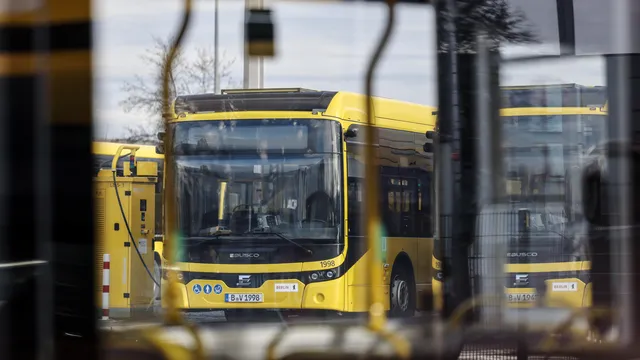For the three young founders, it is not a call to cheat, but a means of restoring social justice.
In Germany, you don't cross the street when the light is red.
Not even when there are no cars, when it's raining, windy, or hailing. It's a principle. To break this rule, you have to be very ill-mannered or, worse, French.
It may therefore seem surprising that in Berlin, if you have the right connections, you can cheat on public transport without any particular difficulty.
To do so, you need a smartphone with internet access and to open a website called "Freifahren" ("travel for free," ed.).
There you can find the location of ticket inspectors in the German capital's subway (U-Bahn), trams, and city and regional express trains (S-Bahn), if they have been reported by the community of over 31,000 people.
The data on the Freifahren platform is largely sourced from a group of the same name on Telegram, whose history is difficult to trace but which has been around for at least five years.
Several hundred messages a day describe in detail the location of ticket inspectors, and sometimes their physical characteristics so that they can be recognized, especially when they are in plain clothes.
Eight administrators moderate the group, for example by deleting photos of ticket inspectors whose faces are visible.
"I was shown the Telegram group a few years ago in the coworking space where I worked. My colleagues used it regularly to cheat," says Marlen (name changed), a 30-year-old graphic designer from Berlin.
"I forgot about it for a while because I prefer to follow the rules, until I forgot to validate a ticket I had bought on my phone. I was checked and the person was so rude to me that I said to myself: I have to warn people about him."
Every day, hundreds of people do the same thing in the encrypted chat.
In Goethe's language, "Freifahren" means both "to travel for free" and "to travel freely." The founders of the platform are David, Johan, and Moritz, three computer science students between the ages of 20 and 21. They met at university in 2023.
Together with friends, they created the website using data from the Telegram group.
"We wanted to contribute something by making the data more visual in the form of a map. We also added analysis functions. We regularly publish a report on Telegram with the times and lines where the ticket inspectors are most active," explains co-founder Johan Trielloff.
The site is open source: its code is available on the GitHub platform and any user can suggest improvements.
For the three creators, their "brainchild" Freifahren is not a call to cheat, but a means of restoring social justice.
"My impetus was reading the book by journalist and lawyer Ronen Steinke Vor dem Gesetz sind nicht alle gleich, "Not All Are Equal Before the Law," published in 2022. The book begins with the case of poor people who are thrown in jail because they cannot pay their fare or fines on public transport. This is particularly common in Berlin and seemed extremely unfair to me," says Johan Trielloff, who grew up in the German capital.
The issue has sparked a real debate across the Rhine, even at the highest levels of government.
At the heart of the problem is a law passed in September 1935 by the Nazi regime that criminalized people who used public transport without paying.
In practice, even today, the fine for fraud can be as high as several thousand euros. If this amount cannot be paid, individuals often have to serve a prison sentence of up to one year.
"The people who end up in prison are mainly unemployed or homeless," explains Leonard Eissen, spokesperson for the Freiheitsfonds ("Freedom Fund") movement, which is campaigning for the repeal of this law.
"On the one hand, we have bad behavior that is not very serious—not paying a ticket for €2-3. On the other hand, we have the state locking people up and spending €200 per person per night in prison. This is disproportionate," he argues.
"Germans are stricter about rules. We are not proud of cheating, as may be the case in France, so it doesn't cause such a fuss," Isen adds.
German cities such as Bremen, Düsseldorf, and Leipzig have decriminalized transport fraud at the local level, which is still punishable by fines but does not lead to imprisonment.
At the national level, this lenient measure has been rejected by the Association of German Transport Companies (VDV), which defends the deterrent effect of penalties and the ability of inspectors to identify or detain individuals.
"No one supports theft by saying that the poorest people cannot afford to buy milk. If we combat the overburdening of the judicial system by repealing laws, we are on the wrong track," said Lars Wagner, a spokesman for the VDV, in August 2024 to the German media outlet ARD.
Although this part of the Penal Code is the subject of debate in Germany, mutual aid groups for fraud are not the focus of media or political attention.
This is in contrast to the other side of the Rhine, where the Akha app, which offered similar features in the Île-de-France region, provoked the anger of the regional authorities.
After an uproar on social media at the beginning of the year, its founder, Sidox – whose real name is Sid Ahmed Mekhiche – was delighted that in less than a week, the number of users had grown from 4,000 to over 130,000 between January 4 and 10, 2025,
Ultimately, the app was declared illegal under the transport code and removed from download platforms following a complaint from the transport company Île-de-France Mobilités.
In early May, the app's creator, Akha, was ordered to pay compensation to the Île-de-France public transport authority.
"I think that here (in Germany, ed.) it's not big enough to attract the attention of the mainstream media," suggests Moritz, co-founder of Freifahren.
For Marlen, who now lives in France, "Germans are stricter about rules. We're not proud of cheating, as may be the case in France, so it doesn't cause such a big fuss."
The Berlin transport company (BVG) has not commented on these mutual aid communities since August 2011, when information about Facebook groups warning of ticket inspectors appeared in the press.
At the time, it believed that this was more likely to encourage people to buy a ticket when they realized there were inspectors around.
For now, this practice is legal in Germany because it exploits a legal loophole.
"Apps for detecting speed cameras that work in a similar way are not illegal in themselves. It is only prohibited to carry them in your car," emphasizes Johan Trielloff.
Just in case, the Freifahren website asks its users to "have a valid ticket for their journey" and "not to actively use the app while traveling."
But even without portals for entering carriages and a beautiful open-source website that could encourage lawbreaking, the rate of fraud in Berlin remains significantly lower than that in the metro and on platforms in the Île-de-France region: 3% compared to around 5% for the metro and RER in Paris.
Fortunately, the same statistics are not calculated for pedestrian crossings, because the French would have even more reasons to be ashamed. | BGNES
---
Mateo Parent, edited by Émile Vaizand, material for the Slate portal.

 Breaking news
Breaking news
 Europe
Europe
 Bulgaria
Bulgaria







